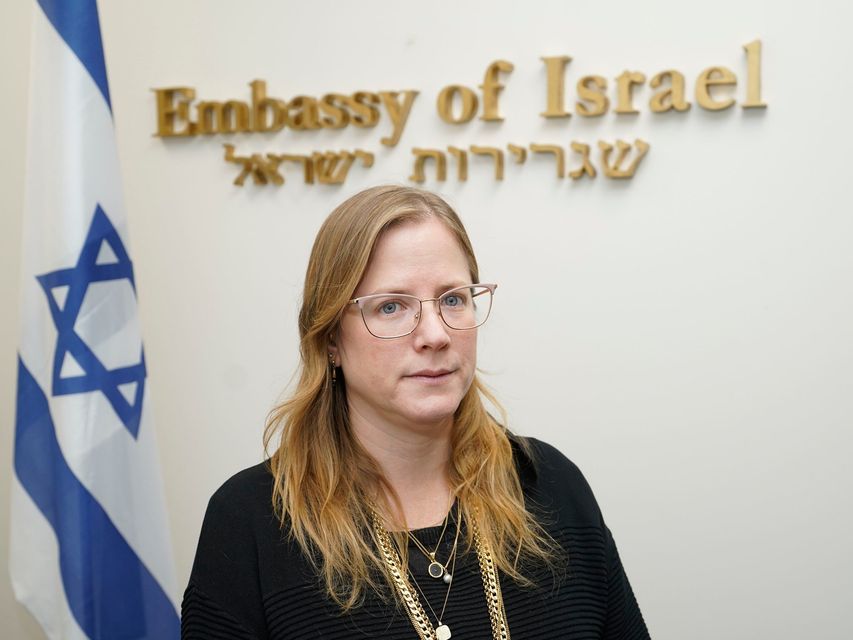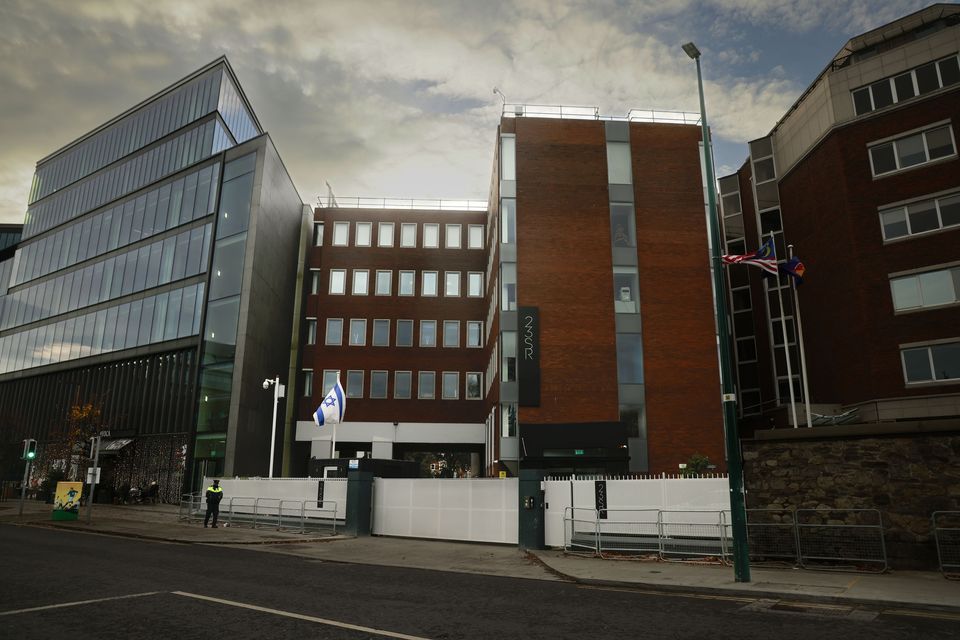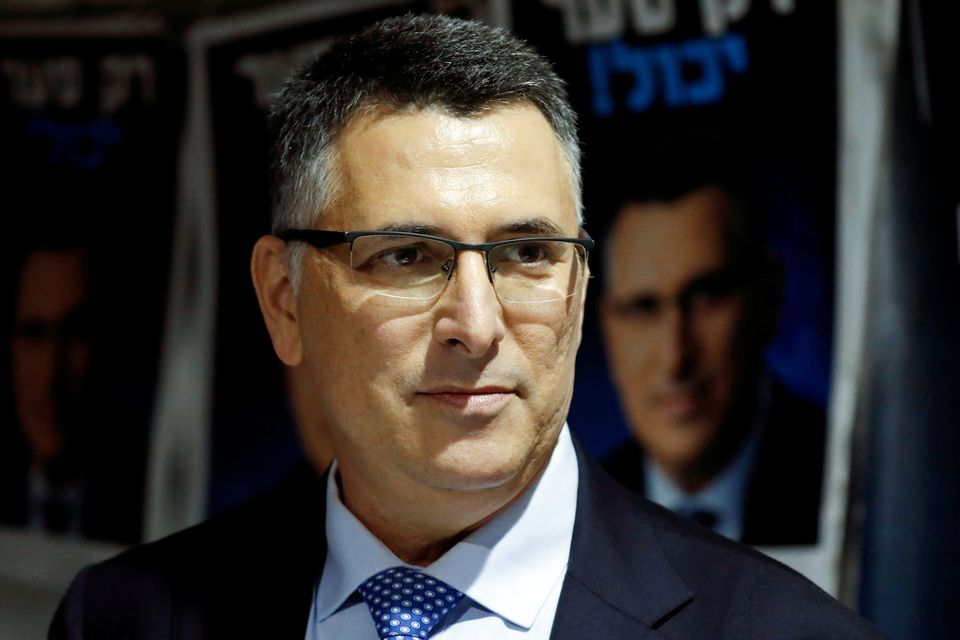Taoiseach expresses ‘deep disappointment’ at move, which follows Ireland’s recognition of Palestinian state and support for South Africa’s case at the International Court of JusticeTánaiste Micheál Martin says Ireland’s embassy in Israel will remain openJewish Representative Council of Ireland ‘deeply concerned’ by deterioration in relations
“There is a difference between criticism – and antisemitism based on the delegitimization and dehumanization of Israel and double standards towards Israel,” Foreign Minister Gideon Saar said in a statement.
“Last night Ireland’s anti-Semitic Prime Minister Simon Harris said in an interview ‘Ireland is not anti-Israel but Ireland is absolutely anti the starvation of children’,” Saar said. “Is Israel starving children?”
He claimed Israel was working to enable humanitarian aid to reach Gaza and prevent civilian casualties. This claim comes as the death toll in Gaza crossed 45,000 since the beginning of the war.
Simon Harris accuses Israel of engaging in ‘distraction’ policies after announcement of embassy closure
The decision to close the Israeli embassy in Dublin has highlighted Israel’s increasing international isolation over the Gaza war, triggered by the October 7, 2023, assault on Israeli communities which led to the killing of 1,200 Israeli citizens and the kidnapping of 250 more.
A spokesperson for the Taoiseach said: “The Taoiseach will not be responding to personalised and false attacks and remains focused on the horrific war crimes being perpetrated in Gaza, standing up for human rights and international law and reflecting the views of so many people across Ireland who are so concerned at the loss of innocent, civilian lives.”
Earlier today Mr Harris expressed his “deep disappointment” after Israel announced it is going to close its embassy in Dublin as they claim that the Irish government has “extreme anti-Israel policies” and crossed “all red lines” towards Israel.
The Government in recent days announced Ireland would join South Africa’s case against Israel at the International Court of Justice (ICJ) in The Hague, which accuses Israel of genocide.
Tánaiste and Foreign Affairs Minister Micheál Martin confirmed there are “no plans” to close Ireland’s embassy in Israel.
“Ireland and Israel will continue to maintain diplomatic relations. Inherent in that is the right to agree and disagree on fundamental points,” he said.
“There are no plans to close Ireland’s embassy in Israel, which is carrying out important work.”
Israel’s ambassador to Ireland, Dana Erlich, said the move to close the Israeli embassy was made in response to a “growing incitement and hatred towards anything Israeli” in Ireland.
Both the Taoiseach and the Tánaiste released statements shortly after the Israeli Foreign Minister Gideon Sa’ar told Israeli media they were closing the embassy in Dublin.
“Ireland’s antisemitic actions and rhetoric against Israel are rooted in delegitimisation and demonisation of the Jewish state and reflect clear double standards,” Gideon Sa’ar said.
“Ireland has crossed all red lines in its treatment of Israel. We will redirect our resources toward advancing bilateral relations with countries based on priorities that reflect how different nations relate to Israel.”
The minister said Ireland’s actions “reflect a clear double standard”.
Ambassador Erlich accused the Irish government of taking steps that are “about isolating and discriminating against Israel” and the country has taken an “extreme” position.
She said the stance taken by Ireland has “crossed the line” and it is “not criticism, but this is pure hatred and obsession that is now also directed to Israelis and the Jewish community”.
“These are tough days. It was a tough decision that was not taken lightly but unfortunately, in the currently hostile atmosphere in Ireland, supported, fostered by the Irish government, this is the correct diplomatic decision to take.”
She directed members of the Israeli and Jewish communities with concerns to bring those concerns to the Irish government who “needs to make sure that they are safe, that there is a future for the Jewish community in Ireland”.
Ms Erlich, who was recalled back to Israel in May when Ireland recognised Palestinian statehood, said there has been a “surge” in anti-Semitism in Ireland and claimed there is “a growing incitement and hatred towards anything Israeli, and unfortunately, it has crossed the line”.
“This is not criticism, but this is just pure hatred and obsession that is now also directed to Israelis and the Jewish community, unfortunately, we’ve seen it throughout this year.”
Speaking to RTÉ’s News at One, she said the Israeli government will continue to help Jewish and Israeli communities in Ireland, adding: “We will continue in contact with our allies and supporters, but the format of the embassy must change in light of these anti-Israeli steps”.
Ms Erlich accused the Irish government of taking steps that are “about isolating and discriminating against Israel” and said the claims brought to the International Court of Justice are “baseless”.
She described the case brought against Israel as “an abuse of the international multilateral system by South Africa” that the Israeli government was “sorry” to see Ireland join.
Ms Erlich said the Irish intervention in the case was not about respecting international law, but about “abusing international systems and playing into the propaganda of terrorism organisations like Hamas, who applauded and welcomed this step”.
“This joins an accumulation of steps, rhetoric and initiatives that we’ve seen Ireland trying to promote this past year. We’ve seen it do it also on a bilateral level, for different legislation. We’ve seen it trying to promote anti-Israel measures within the EU. We’ve seen it foster hostility in different UN resolutions.”
She said Israel still sees Ireland as an “extreme voice in the international arena”, adding that it has taken an “extreme position” that no other country has put itself in and accused the Irish Government of fostering “incitement and hatred”.
On whether the same steps would be taken against Spain or Norway, who also recognised Palestinian statehood earlier this year, Ms Erlich said: “We see Ireland in a more extreme stance than any other country.”
She said Israel made the decision to close the embassy in order to “recalculate our efforts and our resources to a country that does want to broaden engagement with Israel” and ruled out that this would include steps that would see the closure of the Irish embassy in Tel Aviv.
Ms Erlich also claimed that there is “for lack of a better word, an obsession with anti-Israeli steps” in Ireland which are “not about pro-peace” but about “isolating Israel”.
Asked whether Israel hopes this move will damage how Ireland is viewed by the international community and the United States, Ms Erlich said Ireland’s actions to date have already “caused questions in the international community”.
“It’s not about our messages, it’s the actions of the Irish government that are sending messages to other countries, not just Israel”.
Israeli ambassador to Ireland Dana Erlich
Israeli Foreign Minister Sa’ar said there are countries which instead want to build on their links with Israel, such as Moldova and resources will instead be deployed there.
“There are countries interested in strengthening their ties with Israel where we don’t yet have diplomatic missions,” he said.
“We will adjust our diplomatic network while considering, among other factors, different countries’ approaches and actions toward Israel in the international arena.”
‘Bad day for diplomacy’
The former Irish ambassador to the US Dan Mulhall has said the closure of the Israeli embassy in Dublin marks a “bad day for diplomacy”.
He said there will now be a reduction in the Israeli diplomatic presence in Dublin who could speak to the Irish media, people and government about their position and attempt to “bridge the gaps that are there between our two countries”.
Mr Mulhall added that a consulate could potentially remain or the Israeli ambassador to the UK could also be accredited to cover Ireland following the closure, but there will be an inevitable “reduction in the level of contact between Ireland and Israel, which is not a good thing between two countries like ours”.
Speaking to RTÉ’s Morning Ireland, Mr Mulhall acknowledged that the closure of the embassy in Dublin will also be a “complicating factor” in the Irish relationship with the US.
“When the new administration comes in, it will be a moment of risk and jeopardy for Ireland in our relations with the United States because whatever we do with regard to Israel will be looked at carefully in Washington – and there will certainly be a big gap between their instinctive approach to these things and ours and that carries a risk for Ireland, given the importance of our relationship with the United States.”
He said the Irish position is “very reasonable” but it will be “difficult to get through to some of the people who have very strong views and are very supportive of Israel and may not hear what we have to say”.
“We’re not anti-Israel, we’re not anti-Jewish, not anti-Semitic. We simply have concerns and we’re opposed to certain aspects of Israeli government policy. I mean, if someone criticises Ireland for some particular diplomatic move we’ve made, it doesn’t mean they’re anti-Irish.”
Mr Mulhall said there will be a need to be “careful” in the approach once US president-elect Donald Trump assumes office.
“I’m not saying we should abandon our policies or positions – certainly not – but we will have to factor in how those positions might go down in Washington and what the consequences might be for our vital relationship with the United States.”
Chair of Jewish council ‘deeply concerned’
The chair of the Jewish Representative Council of Ireland said he was “deeply concerned” by the deterioration in relations between Ireland and Israel.
Maurice Cohen told RTÉ that the Irish Government’s intervention in the ICC case risks “oversimplifying a highly complex and tragic conflict, unfairly isolating Israel, and undermining the integrity of the term ‘genocide'”.
He said the closure of the embassy was “particularly distressing for the Jewish community in Ireland”.
“For these individuals, the closure of the embassy represents not only a symbolic blow but also a practical disadvantage,” he said.
“Consular services provided by the embassy are vital for those maintaining connections with family, culture, and heritage in Israel. Losing this resource will leave many feeling unsupported and aggrieved.
“Closing the embassy risks alienating a significant segment of Irish society and sends a message that dialogue is being replaced by disengagement,” he said.
He said the council was committed to peace and the protection of innocent lives “on all sides of the Israeli-Palestinian conflict”, while also supporting Israel’s right to defend itself from “terrorism and existential threats”.
Mr Cohen called on the Irish and Israeli governments to rebuild trust and make sure diplomatic channels remained open.
Ambassador recalled
Israel’s ambassador to Ireland, Dana Erlich, was recalled back to Israel in May when Ireland recognised the state of Palestine.
The embassy did not immediately respond to a request for comment. It is not clear on what date the embassy will close.
Releasing a statement on Sunday afternoon, Taoiseach Simon Harris said: “Ireland’s foreign policy is founded on our deep commitment to dialogue and to the peaceful resolution of disputes.
Embassy of Israel to Ireland in Ballsbridge, Dublin. Picture: Arthur Carron
“Resident embassies play a very important role in that regard.
“Keeping channels open has never been more important so that we can better understand each other’s positions, even when we disagree.”
He continued; “I utterly reject the assertion that Ireland is anti-Israel. Ireland is pro-peace, pro-human rights and pro-international law.
News in 90 seconds – 15 December 2024
“Ireland wants a two-state solution and for Israel and Palestine to live in peace and security. Ireland will always speak up for human rights and international law. Nothing will distract from that.”
Speaking in Brussels this morning, Tánaiste Micheál Martin said any action taken by the Irish government in relation to the ongoing situation in Palestine has been motivated only by a respect of international humanitarian law and human rights. He sad Ireland would not be closing its embassy in Israel.
“We’ve consistently called for an immediate ceasefire, release of all hostages and a massive surge of humanitarian aid. Recognising a state of Palestine, which we did with Norway and Spain – and which other countries have done – is not a hostile act, and should not be seen as a hostile act,” he said.
Mr Martin said the utilisation of the international courts “should not be seen as a hostile act”.
“Ireland stands by the approach it has taken which has been motivated towards full accountability for what is happening in Gaza and for respect for international humanitarian law and human rights that applies to Hamas, it has applied to Hezbollah, and it applies to the Israeli government as well.”
He added: “I find it very difficult to comprehend how those acts could be described as hostile acts. They are not hostile acts.”
“What’s happening in northern Gaza at the moment, for example, in my view, is beyond any moral compass, defies any explanation at this stage, given how long this war has waged. We’re having daily reports of the killings of children and men and women – and Irish people are repulsed by that. That’s basically the essence of the Irish response and we believe passionately that there’s an alternative route now”.
He said Ireland continues to call on Israel to “open up Gaza” to allow the international community and the media to bear witness to what is happening.
“I have no doubt if that happened, that the world would be shocked in terms of the level of the destruction that has occurred there and the absolute need for a fundamental change of approach,” Mr Martin said.
Gaza latest
Israeli forces continued to pound Gaza on Sunday, including the largely isolated north, as the Palestinian death toll in the war approached 45,000.
A large explosion lit up the southern Gaza skyline on Sunday night. An Israeli airstrike hit a school and killed at least 16 people in the southern city of Khan Younis, according to Nasser Hospital, where the bodies were taken. There was no immediate Israeli military statement.
In the north, an airstrike hit the Khalil Aweida school in the town of Beit Hanoun and killed at least 15 people, according to nearby Kamal Adwan Hospital where casualties were taken.
The dead included two parents and their daughter and a father and his son, the hospital said.
Palestinians carry UN-donated flour in Khan Younis, in central Gaza, on Saturday (Abdel Kareem Hana/AP)
And in Gaza City, at least 17 people including six women and five children were killed in three airstrikes that hit houses sheltering displaced people, according to Al-Ahli Baptist Hospital.
“We woke up to the strike. I woke up with the rubble on top of me,” said Yahia al-Yazji. “I found my wife with her head and skull visible, and my daughter’s intestines were gone. My wife was three months pregnant.”
Israel’s military said in a statement it struck a “terrorist cell” in Gaza City and a “terrorist meeting point” in the Beit Hanoun area.
Another Israeli airstrike killed a Palestinian journalist working for Al Jazeera, Ahmed al-Lawh, in central Gaza, a hospital and the Qatari-based TV station said.
The strike hit a point for Gaza’s civil defence agency in the urban Nuseirat refugee camp, Al-Awda Hospital said.
Also killed were three civil defence workers including the local head of the agency, according to Al-Aqsa Martyrs hospital. The civil defence is Gaza’s main rescue agency and operates under the Hamas-run government.
“We, the civil defence, are carrying out humanitarian work like in any country in the world. Why are we being targeted?” said Kerem Al Dalou.
Israel’s military said it struck a militant command centre embedded in the civil defence offices.
The war in Gaza began after Hamas and other militants from Gaza stormed southern Israel on October 7 2023, killing some 1,200 people and taking well over 200 hostage.
Israel’s retaliatory offensive has killed almost 45,000 Palestinians, according to Gaza’s Health Ministry. The ministry’s count does not distinguish between combatants and civilians, but it says more than half of the dead have been women and children.
Most of Gaza’s population of some two million has been displaced, often multiple times. The hospitals that are still functioning say they lack medicines, fuel and other basic supplies, while aid groups warn of widespread hunger.
The head of the World Food Programme, Cindy McCain, told US broadcaster CBS on Sunday that the UN agency was able to get just two trucks of supplies into Gaza in November, citing insecurity there.
“We need a ceasefire, and we need it now,” she said. “We can no longer sit by and just allow these people to starve to death.”



